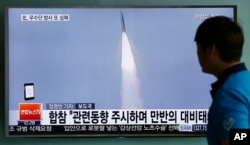The newly announced U.S. sanctions on North Korean leader Kim Jong Un for human rights violations is not expected to have any immediate impact, but advocates say the new measures will increase pressure on the repressive state and continue to isolate its leadership.
South Korea on Thursday expressed solidarity with Washington’s decision to blacklist the North Korean leader, along with 22 other entities and individuals, for their role in serious human rights violations, hunting down defectors or censorship in North Korea.
“We are expecting that the sanctions will raise the awareness of the international community about the grave situation of broad and systemic human rights violations in North Korea, while contributing to strengthening related measures and advancing the discussion on this matter," said South Korean Foreign Ministry spokesman Cho June-hyuck.
U.S. Ambassador to the United Nations Samantha Power said in a statement, “ These efforts send a clear message – not just to the senior leaders, but also prison camp managers and guards, censors, secret police, interrogators, and persecutors of defectors – the world is documenting your abuses, and they will not be forgotten.”
In 2014, a United Nations Commission of Inquiry issued a report documenting North Korea’s pervasive and systematic human rights abuses, including extrajudicial killings, enforced disappearances, arbitrary arrests, beatings, forced starvation, sexual assault, forced labor and torture. Many of these abuses, the reported noted, are committed in the country's political prison camps, where an estimated 80,000 to 120,000 men, women and children are held.
Human rights precedent
The U.S. measures announced Wednesday mark the first time North Korea has been sanctioned solely for human rights violations.
The advocacy group Human Right Watch said the new sanctions reflect a growing international focus and concern about the ongoing atrocities occurring in North Korea.
“What we’re seeing now is that concern about human rights abuses by the North Korean government and junior people in that government have really become part of the mainstream in the engagement of the international community with North Korea,” said Phil Robertson, the deputy director of Human Rights Watch's Asia division.
Since 2006, the United Nations has imposed increasingly stronger sanctions on North Korea for continuing to develop its banned nuclear weapons and ballistic missile program.
This year, the United Nations Security Council imposed tough new measures that include suspending currency transfers and restricting the North’s lucrative mineral trade after North Korea conducted its fourth nuclear test and a long-range rocket launch using ballistic missile technology.
North Korea defiance
North Korea is expected to react with defiance to the new U.S. sanctions. Following the latest U.N. sanctions, North Korea vowed to continue its nuclear development program and test fired multiple short and medium range missiles.
The immediate economic impact of the sanctions is expected to be quite limited, since the United States has virtually no direct business ties to North Korea.
And some analysts say the increased sanctions will only harden the adversarial stand-off between Pyongyang and Washington, and make it more difficult to pursue diplomatic negotiations in the future.
Even though the impact of the new sanctions may be largely symbolic, U.S. officials said it was important to put the Kim Jong Un government on notice for its repeated and ongoing violations.
“It would send absolutely the wrong message to him and could embolden him to continue these depravities on his own people if you just, if you just sit by quietly and say nothing and do nothing and sanction nothing," said U.S. State Department Spokesman John Kirby.
Under the so-called Specially Designated Nationals and Blocked Persons list, property or interests of those designated within the U.S. jurisdiction will be frozen. In addition, transactions by U.S. citizens involving the designated persons are generally prohibited.
Other North Korean officials designated in the blacklist include Choe Pu Il, minister of People's Security; Ri Song Chol, a counselor in the Ministry of People's Security; as well as Kang Song Nam, a bureau director with the Ministry of State Security.
U.S. officials said Wednesday's actions will strengthen and expand sanctions on North Korea. They are consistent with the North Korea Sanctions and Policy Enhancement Act of 2016, which was passed by Congress and signed into law by President Barack Obama in February.
In addition to Kim Jong Un the United States is also blacklisting Syrian President Bashar al-Assad, Zimbabwean President Robert Mugabe and Belarussian President Alexander Lukashenko.
Youmi Kim in Seoul contributed to this report. Nike Ching reported from the State Department in Washington.










